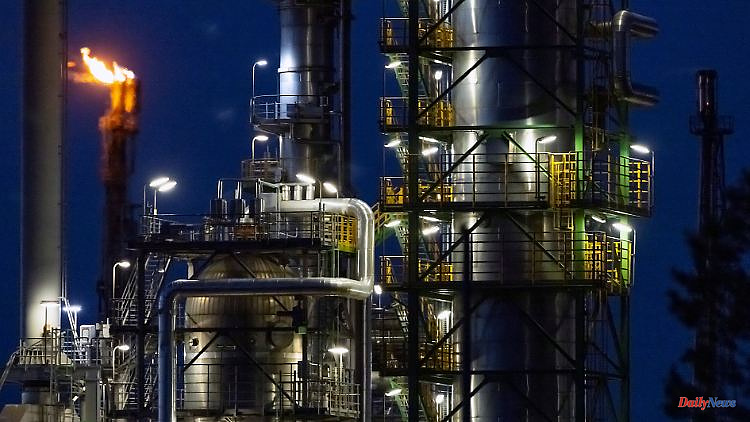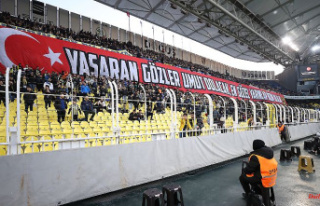The federal government is trying to outmaneuver the Russian majority owner of the refinery in Schwedt. But he goes to court. Meanwhile, Poland is reluctant to help secure oil supplies. Deliveries are now supposed to come from Kazakhstan. But they have to flow through Russia.
The refinery in Schwedt, Brandenburg, is important for supplying East Germany, including Berlin, with petrol and diesel. Most of the kerosene for the capital's airport BER also comes from there. The problem: Supplying the plant, which belongs to the joint venture PCK, with oil is - to put it mildly - complicated.
That's because before the Russian invasion of Ukraine, the refinery was almost entirely supplied with oil from Russia. The raw material was pumped through the Druzhba pipeline to Schwedt via Poland. Almost twelve million tons were processed there every year.
After the invasion of Ukraine, Germany stopped buying Russian oil. Since then, a replacement has been sought - and this process is proving tough. The situation is particularly complicated by the fact that the Kremlin-controlled oil giant Rosneft, as the majority owner, holds around 54 percent of the shares. However, the federal government has put the German subsidiaries of the state-owned company, which hold the shares, under trusteeship. The Russians have thus lost direct influence on the plant.
In order to reliably ensure high utilization of the refinery, Germany is currently dependent on support from Poland. The reason: It is estimated that deliveries by ship via the port of Rostock can only be used to about half capacity. However, the aim is a capacity of at least 70 percent, also so that fuel prices in the east do not rise too much. They are already mostly higher there than in the west.
One solution is deliveries by tankers calling at the port in the Polish port of Gdańsk. From there, the oil can be pumped to Schwedt through the Druzhba pipeline network on Polish territory. At the moment it looks as if Poland will actually make this possible - albeit very hesitantly. Individual tankers are unloaded there. However, it does not look like there will be a permanent supply via this route at the moment.
Because legally, Rosneft is still the majority owner of the refinery. The Polish government sees this as a major problem and is apparently only prepared to make long-term commitments once the Russians have finally lost control of the plant.
One way out could be for the federal government to sell the shares that are under trust. The Federal Ministry of Economics has initiated a change in the law for this purpose. They make it easier to sell shares in companies that are held in trust.
Formally, Rosneft Germany would remain under trusteeship. But the buyer of the refinery shares could dispose of his new acquisition. The legally difficult and therefore more risky attempt to expropriate the Rosneft subsidiary could be avoided in this way.
The Polish oil company Orlen, in which the state is the largest shareholder, has signaled an interest in buying into PCK if Rosneft no longer has a stake in the refinery. German companies are also interested. Kazakhstan is also reportedly toying with participation.
The second largest owner of the refinery operator, the Anglo-Dutch Shell group, has already announced that it intends to sell its stake of around 37 percent. The Italian Eni, which owns around 8 percent of the refinery, wants to remain a co-owner.
But there is a problem. Rosneft is suing the trustee. The Federal Administrative Court in Leipzig will not make a judgment until next week at the earliest - it is unclear how it will turn out. And it is quite likely that after the verdict the legal dispute will be continued in higher instances.
An end to the stalemate over the oil supply with Schwedt is therefore not in sight. In order to ensure higher utilization, oil should now flow from Kazakhstan - at least in smaller quantities. However, the oil has to be transported several thousand kilometers across Russian territory. This leads to two problems: On the one hand, Russia collects transit fees for the transit. On the other hand, the Kremlin can stop the transit suddenly and without warning. And the past has shown that he is willing to do so.
Meanwhile, the Kazakh pipeline operator KazTransOil and the Russian company Transneft have confirmed that oil will flow to Germany via the Druzhba pipeline. However, there are serious doubts that the Russians will permanently conduct Kazakh oil. They were intensified because Transneft announced that it would stop deliveries to Poland at the same time as the green light to Germany. The country had still obtained oil directly from Russia by pipeline.
In order to ensure long-term supply, the pipeline that runs from Rostock to Schwedt is to be renewed. The federal government wants to assume the estimated costs of 400 million euros. According to the Ministry of Economic Affairs, around nine million tons per year could then be pumped through the pipeline. So far it has been between six and seven million tons. The expansion should enable the refinery to be used between 75 and 80 percent just by transporting oil via the port of Rostock. But there is a hurdle here too: the EU Commission still has to approve the plans.












